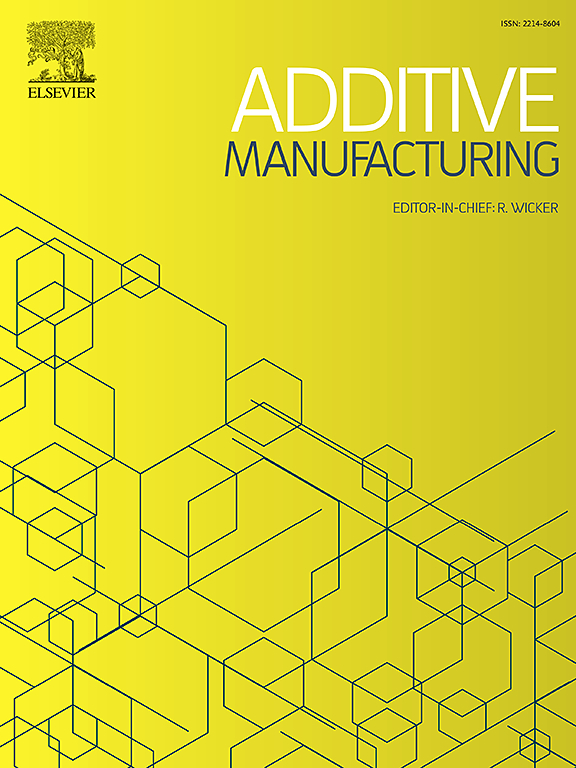Online thermal profile prediction for large format additive manufacturing: A hybrid CNN-LSTM based approach
IF 11.1
1区 工程技术
Q1 ENGINEERING, MANUFACTURING
引用次数: 0
Abstract
Large format additive manufacturing (LFAM) is an advanced 3D printing technique that efficiently fabricates large-scale components through a layer-by-layer extrusion and deposition process. Accurate surface layer temperature monitoring is essential to prevent manufacturing failures and ensure final product quality. Traditional physics-based offline approaches for simulating thermal behavior are often inefficient and complex, posing challenges on real-time, in-situ monitoring. To address this, we propose a data-driven hybrid CNN-LSTM model to predict sequential thermal images of arbitrary length using real-time infrared thermal imaging. In this approach, a Convolutional Neural Networks (CNN) is trained offline to capture spatial features, reduce dimensional complexity, and enhance time efficiency, while a stacked Long Short-Term Memory (LSTM) is applied online to capture temporal information for improved prediction of future thermal behavior in subsequent printing layers. Model performance is evaluated using MSE, SSIM, and PSNR metrics and is benchmarked against stacked LSTM and convolutional LSTM models, demonstrating superior accuracy and applicability. Additionally, to mitigate noise from moving extruders and gantry backgrounds in thermal images, a fine-tuned semantic segmentation model is impletemented offline to extract printing geometry, enabling precise temperature tracking along the tool path for further thermal analysis. The frameworks developed in this study significantly advance temperature monitoring, thermal analysis, and in-situ manufacturing control for LFAM, bridging the gap between theoretical modeling and practical application.
大型增材制造热剖面在线预测:一种基于CNN-LSTM的混合方法
大幅面增材制造(LFAM)是一种先进的3D打印技术,通过逐层挤压和沉积工艺有效地制造大型部件。准确的表面层温度监测对于防止制造故障和确保最终产品质量至关重要。传统的基于物理的离线热行为模拟方法通常效率低下且复杂,给实时、原位监测带来了挑战。为了解决这个问题,我们提出了一个数据驱动的CNN-LSTM混合模型,利用实时红外热成像预测任意长度的序列热图像。在该方法中,离线训练卷积神经网络(CNN)来捕获空间特征,降低维度复杂性并提高时间效率,而在线应用堆叠长短期记忆(LSTM)来捕获时间信息,以改进后续打印层的未来热行为预测。模型性能使用MSE、SSIM和PSNR指标进行评估,并针对堆叠LSTM和卷积LSTM模型进行基准测试,显示出卓越的准确性和适用性。此外,为了减轻热图像中移动挤出机和龙门架背景产生的噪声,离线实现了微调的语义分割模型,以提取打印几何形状,从而实现沿着刀具路径的精确温度跟踪,从而进行进一步的热分析。本研究开发的框架显著推进了LFAM的温度监测、热分析和原位制造控制,弥合了理论建模和实际应用之间的差距。
本文章由计算机程序翻译,如有差异,请以英文原文为准。
求助全文
约1分钟内获得全文
求助全文
来源期刊

Additive manufacturing
Materials Science-General Materials Science
CiteScore
19.80
自引率
12.70%
发文量
648
审稿时长
35 days
期刊介绍:
Additive Manufacturing stands as a peer-reviewed journal dedicated to delivering high-quality research papers and reviews in the field of additive manufacturing, serving both academia and industry leaders. The journal's objective is to recognize the innovative essence of additive manufacturing and its diverse applications, providing a comprehensive overview of current developments and future prospects.
The transformative potential of additive manufacturing technologies in product design and manufacturing is poised to disrupt traditional approaches. In response to this paradigm shift, a distinctive and comprehensive publication outlet was essential. Additive Manufacturing fulfills this need, offering a platform for engineers, materials scientists, and practitioners across academia and various industries to document and share innovations in these evolving technologies.
 求助内容:
求助内容: 应助结果提醒方式:
应助结果提醒方式:


